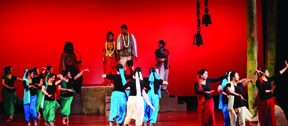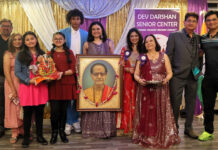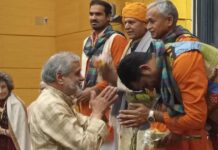 PALO ALTO: Drawing from deep personal connections, Ranjita Chakravarty, in her directorial debut, dedicated the production of “Chitra… The Warrior Princess” to the 154th birth anniversary of India’s poet laureate, Rabindranath Tagore. The story and its presentations have undergone several revisions by Tagore himself, from when he first wrote it in 1895, as a verse drama, “Chitrangada” in his native language, Bengali.
PALO ALTO: Drawing from deep personal connections, Ranjita Chakravarty, in her directorial debut, dedicated the production of “Chitra… The Warrior Princess” to the 154th birth anniversary of India’s poet laureate, Rabindranath Tagore. The story and its presentations have undergone several revisions by Tagore himself, from when he first wrote it in 1895, as a verse drama, “Chitrangada” in his native language, Bengali.
In keeping with the times, he rewrote it as an abridged English translation named “Chitra”. Again, later in life, the poet returned it to a musical dance drama format, closer to its origins. Today, it was presented as a poetic drama, a culmination of all that is the best performing arts has to offer – poetry, song, acting, dancing, storytelling – all through a minimal cast and stage setting, relying on the power of the enduring saga and its endearing depiction.
The Cubberly Theater in Palo Alto provided the intimate milieu so important to draw the audience into the unfolding tale on the stage.
The linear development of the story hinges on the human want to be loved for its true inner self, rather than the illusion of the external appearance, however attractive that might be. Through the medium of dance and drama, Tagore’s progressive views on female expression of carnal desire are brought forth as a nuanced performance by Deergha Sahni, who carries the weight of the role on her winsome shoulders with grace and aplomb.
Raised as a warrior princess by the King of Manipur, who wished only sons, she displays perfection in the art and science of battle. The opening scene with hued lighting and simple sets was charming, and the warrior poses that Chitra strikes with her trainer quite fetching, as was the short display of her warrior skills with weaponry. It left me wanting for more to firmly establish her prowess in this role.
Immediately following is the entry of the other central character in the story, the Love God, Madan, who grants Chitra her wish to appear as an enchantress to woo Arjun who she encounters earlier in the forest. Arjun is spending his time in exile having taken the vow of celibacy and has spurned Chitra’s bold advances. She succeeds in winning Arjun over, using the weapon of her exquisite beauty and divested of her warrior qualities.
The year passes for the lovers with fun and frolic presented as various dancers strive to convey the muse. Sanjib Bhattacharya, the stalwart of Manipuri dance, was specially delightful throughout his many appearances on stage. Just when you begin to think that the dialogue intense exchanges are hanging too long, the flow of the story resumes with a dance, a song, or a change of scenery.
As the end of the year of her boon from Lord Madan draws near, Chitra wishes to return to her original self, and wants the love of her beloved based on the reality of who she is, not the illusion of who he thinks she is. The complacent days take their toll, as Chitra emotes her anguish and turmoil with her duplicitous life. While her love stays the course, she wishes to have it returned without the trappings of beauty, rather as an equal partner to Arjun.
As marauders besiege her native kingdom, the villagers appeal to Arjun to save them, in the absence of their protector, Chitra. Arjun then is consumed with thoughts of Chitra and longs to meet a woman who is considered his equal in battle. Arjun’s introspection is debated by Chitra who tries to thwart his increasing longing by commenting on the probable lack of beauty of the warrior princess.
Arjun is now convinced that he would be honored to fight alongside her to save her kingdom. This moment of realization of her true strength liberates Chitra from the bonds of falsehood, and she claims Arjun’s love by revealing her true self as the warrior princess. The contemporary sentiments of the play are as aligned with those of centuries ago, as a woman’s germane need to be a respected and equal partner to her consort, in no way diminishes her inner strength and true identity.
Deergha was superbly cast as the title character, and convincingly conveyed the duality of her role as the warrior princess, and the nubile enchantress. Myrton Runningwolf, as Arjun commanded the stage with his dominant persona. The comedic factor was offered by Madan, well played by Havish Ravipati. At times, a lack of color and simple costumes of support dancers took away from the graceful flowing movements of Tagore dancers, while the live singing of Sonali Bhattacharya and Subhen Khatua filled the auditorium with melodies of yesteryears.
Ranjita demonstrated inspired directorial prowess, exacting passionate role playing by her cast. The modern context of the story is evident in the English dialogue, while the flavor of the original writing comes through the live singing in Bengali. All in all, an interesting and entertaining adaptation of a modern rendition of an age old classic.
Archana Asthana






